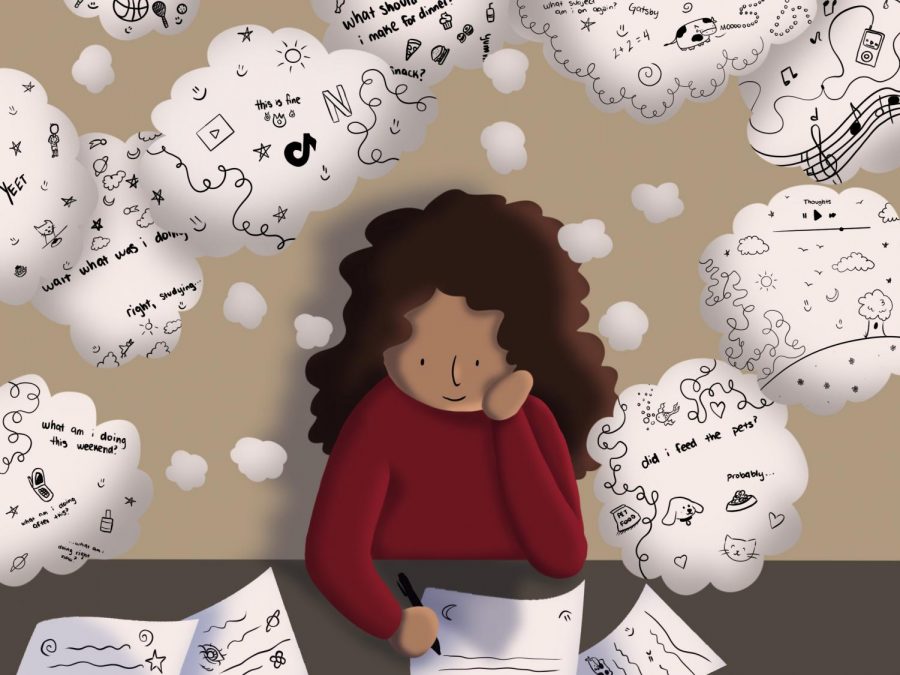ADHD is not a choice
Learning about reality of mental illness stops stigma
September 23, 2021
Editor’s note: Before you suspect that you have ADHD after reading some of the symptoms mentioned below, I urge you to read the DSM-5 diagnosis criteria to avoid misdiagnosing yourself. ADHD is uncommon, only occurring in 5 percent of children and 2.5 percent of adults across most cultures, so do not solely rely on this column as evidence to suggest you have ADHD.
Many of you have stories to tell regarding your experiences with mental illness. In this column, I will relay three stories of people from across the country to show you that mental illness is common and that you are not alone.
Around the second grade, my younger sister, Ally, started to struggle in school and fall behind. She was either bouncing off the walls — living in the moment — or sitting in her class staring at a wall for hours.
My mother decided to take her to a specialist to see if she had a type of learning disability.
At the age of 7, Ally was diagnosed with Attention-Deficit/Hyperactivity Disorder: a “persistent pattern of inattention and/or hyperactivity-impulsivity that interferes with functioning or development,” according to the Diagnostic and Statistical Manual of Mental Disorders published by the American Psychiatric Association.
A persistent pattern of inattention may be having difficulty maintaining attention in tasks or activities, such as listening to lectures or reading lengthy literature, or being easily distracted by extraneous stimuli. Hyperactivity-impulsivity may be running around or climbing in inappropriate situations, blurting out an answer before the question is completely asked or fidgeting while seated.
After Ally was diagnosed with ADHD, the specialist-prescribed medication to help her ability to focus and level out her emotional peaks. My mother said she decided to give the medication a try because she could see Ally losing her self-esteem and confidence.
After the doctor’s appointment, Ally looked up at my mother with her big, glassy, blue eyes and asked, “Mom, will this medicine make me smart?”
After interviewing others with ADHD, I found it is very common for people to believe they are not smart prior to — and sometimes after — diagnosis.
Lance Anderson, Sierra High School junior, was diagnosed with ADHD at 6 years old. Prior to diagnosis, he also believed he was not smart, but it did not stop there.
“After I got diagnosed with ADHD, my self-esteem started to deplete,” he said. “I got held back a grade, which definitely impacted how I viewed myself.”
Anderson also said that having ADHD often makes him feel very depressed.
“You never know how someone will react, which makes it complicated for those who suffer from ADHD and those around them,” he said. “I’ve lost more friends than I can remember, and I still think I’m going to lose more if I don’t say how I feel sometimes.”
Dayna Stevens, University of Michigan nursing graduate student, was diagnosed with ADHD when she was 18 years old.
Before her diagnosis, Stevens felt she was the dumb person in her friend group, and she believed that she was not going to be as successful as others.
“Having an older sister who was so smart [also made it] very hard,” she said. “I had times when I felt knocked down by my parents on things like picking a major and having them question if I was smart enough to succeed.”
Sadly, Ally relayed the same things to me. It is heartbreaking to see highly-capable people doubt their abilities to succeed because of the struggles that come with ADHD. People with ADHD are not inferior and neither we, nor them, should ever think of them as such.
There are a variety of medications to help combat the symptoms of ADHD. The problem is, however, that the wrong medication can gravely affect an individual’s personality, changing them into completely different people.
Throughout her adolescent years, Ally tried many medications, but most turned her into a hermit — completely withdrawn from society. Instead of her highly energetic, bubbly self, she was melancholy and often stayed in a dark room to play with toys by herself.
Anderson and Stevens had similar experiences regarding the effects of medication. They both said they prefer not taking it but know they need the medication to be perceived as “normal.”
“With medication, you become more dependent, quiet and, in my personal experience, depressed,” Anderson said. “You also end up being lazier but also more focused.”
Stevens went into detail about her experiences with prescribed medication.
“When I was on medications, I was in a really bad place mentally,” Stevens said. “I wouldn’t eat because I knew that Adderall [the prescribed medication] would curb my appetite.”
If Stevens missed a couple of days of medication, she would experience a roller-coaster of emotions. She would get mad at someone for chewing too loud and she would often lock herself in the library to study for hours on end.
ADHD medication definitely has its pros and cons. On the one hand, no one wants to be a completely different person, but on the other hand, it is hard to focus on things, such as schoolwork, without medication.
Do not get confused, though, Ally still experiences symptoms of ADHD while on the medication, such as being easily distracted, procrastinating on schoolwork and having random bursts of energy. Medication does not “cure” her; it levels her out.
Also, I would like to state very clearly to never ask someone if they have taken their medication. It can be extremely offensive to someone whose self-esteem and confidence are low. Even though you think you are asking a simple question, they might perceive it as an attack on their personality.
The struggles that come with ADHD are so often overlooked. Our society refuses to take ADHD seriously, labeling those with the diagnosis as lazy and unmotivated, exaggerating their reality to get away with not doing their homework.
In addition to the interviewees, I have met others at WSU with ADHD who experience the same struggles. Please love and respect your fellow Cougs, despite their experiences and struggles with mental illness.
Educate yourself and listen to others’ experiences regarding ADHD. Ally highly recommends you watch Connor DeWolfe on TikTok. He posts amazing videos that illustrate the thought processes of those with ADHD in a comedic yet entertaining way.
It is important to share your experiences with mental illness to help break down the social stigma. In addition, check out Cougar Health Services on campus, which provides counseling and psychological services and health promotion to students.











